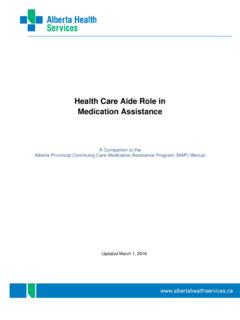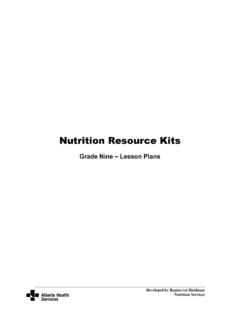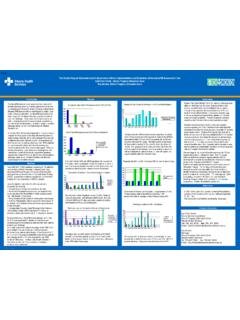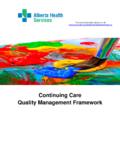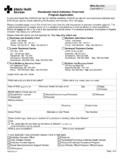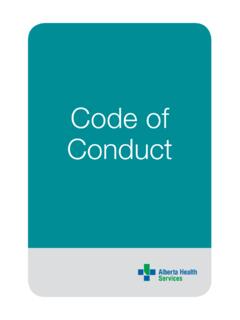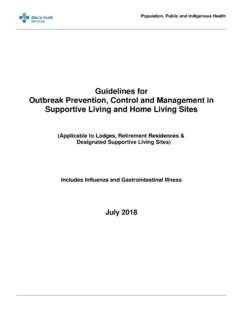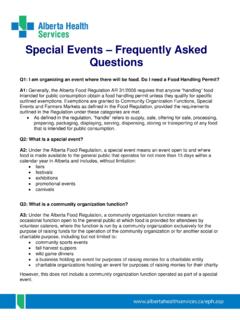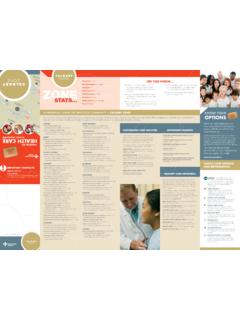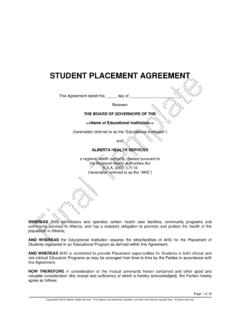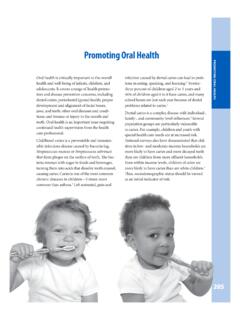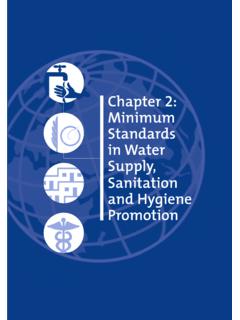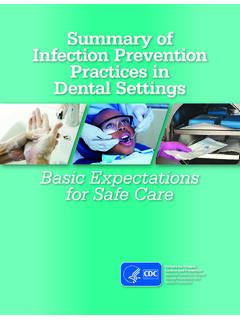Transcription of Symptom Management Summary Oral Care
1 Guideline Summary for Health Professionals oral Care Tips (Mucositis, Candidiasis & Xerostomia). Effective Date: January 1, 2019. Last Updated February 7, 2019. oral Care Management Tips for Healthcare Professionals: Mucositis, Candidiasis, Xerostomia Table of Contents oral Care: Mucositis .. 2. Step 1. Top underlying treatable causes and diagnosis: .. 2. Step 2a. Non-pharmacological Management : .. 2. Step 2b. Pharmacological options: .. 3. Step 3. When to refer to palliative care specialist: .. 4. oral Care: Candidiasis .. 4. Step 1. Top underlying treatable causes and diagnosis: .. 4. Step 2a. Non-pharmacological Management : .. 4. Step 2b. Pharmacological options: .. 4. Step 3. When to refer to palliative care specialist: .. 5. oral Care: Xerostomia .. 5. Step 1. Top underlying treatable causes and diagnosis: .. 5. Step 2a. Non-pharmacological Management .
2 5. Step 2b. Pharmacological options: .. 6. Step 3. When to refer to palliative care specialist: .. 6. Page 1 of 7. Guideline Summary for Health Professionals oral Care Tips (Mucositis, Candidiasis & Xerostomia). Effective Date: January 1, 2019. Last Updated February 7, 2019. oral Care: Mucositis Step 1. Top underlying treatable causes and diagnosis: Mucositis is a highly unpleasant side-effect of many chemotherapies, including 5FU used in colorectal cancer, as well as head and neck radiotherapy. It is characterized by inflammation and breakdown of the oral mucosa with the formation of erythema and painful ulcers. Several grading scales can be used based on Symptom severity, or appearance, or both. One example is: oral MUCOSITIS GRADING SCALE. NCI Common Terminology Criteria for Adverse Events (Version ). Grade 1 Grade 2 Grade 3 Grade 4 Grade 5. (Mild) (Moderate) (Severe) (Life-threatening).
3 Asymptomatic or Moderate pain; Severe pain; Life-threatening Death mild symptoms; not interfering interfering with consequences;. Intervention not with oral intake; oral intake urgent indicated modified diet intervention indicated indicated Adapted from: Contributing factors to consider: o Periodontal disease gum disease, trauma from ill-fitting dentures, or salivary gland dysfunction o Medications causing dry mouth anticholinergics o Smoking and Alcohol o Secondary Infection Step 2a. Non-pharmacological Management : Provide patient information on self-care Share patient guide with patient/family Mouth and Dental Care for Cancer Patients . Ensure patient knows how to optimize their routine oral hygiene and nutrition before, during and after their cancer therapies Help enable access to dental care if needed Review Basic Advice Hard, acidic, salty or spicy foods can irritate the tissues.
4 Cool or lukewarm foods and soft, pureed foods may be better tolerated. Alcohol and tobacco should be avoided. Poorly fitting dentures or sharp teeth may exacerbate symptoms and should be corrected. Dentures may need to be refitted on more than one occasion if there is progressive weight loss. Partly edentulous elderly are at particularly high risk for poor chewing and swallowing function, so soft and pureed foods become more important for this group. Page 2 of 7. Guideline Summary for Health Professionals oral Care Tips (Mucositis, Candidiasis & Xerostomia). Effective Date: January 1, 2019. Last Updated February 7, 2019. Recommend alcohol-free rinsing after meals ( with club soda or 1 tablespoon of sodium bicarbonate in 2 cups of water) and high fluoride content toothpaste (5000ppm) used twice daily Prevident 5000 plus. Step 2b. Pharmacological options: Mouthwash for oral hygiene Use an alcohol-free chlorhexidine mouthwash as tooth brushing is unlikely to be adequate for plaque removal.
5 If the mouth is too painful for cleaning with a toothbrush, oral sponges can be used with alcohol free chlorhexidine mouthwash for cleaning. o Directions: Swish 15 mL in your mouth undiluted for 30 seconds, then spit out. Use after breakfast and before bedtime, avoid eating or drinking for approximately 30 minutes after its use. Preventing and relieving mild mucositis (grade 1). Benzydamine hydrochloride mouthwash (15 ml used four to eight times daily) starting before, during, and for two or three weeks after head and neck radiotherapy or chemotherapies causing mucositis, to help reduce the frequency and severity of symptoms, however it contains alcohol and can sting or burn (this may be avoided by diluting with equal parts of lukewarm water prior to use). For certain chemotherapy regimens only, such as bolus 5-FU, patients will be directed by the treating team to use oral cooling (ice chips) 30 minutes prior to administration.
6 Symptom relief (grade 2-3). In addition to the above Management , Magic mouthwash preparations that are compounded solutions that may help with Symptom relief. In Alberta, Akabutu's and Pink Lady are commonly used. THESE FORMULATIONS ARE NOT BASED ON LITERATURE, but are from unpublished data, historical use, or physician/pharmacy experience. Akabutu's mouthwash has to be compounded by pharmacies and contains: Nystatin 100,000 unit/ml 42 ml, Lidocaine HCL Viscous 2% 50 ml, Sodium chloride 200 ml, Hydrocortisone 10 mg x 5. tabs, glycerin 100% 4 ml. Swish/gargle 15-30 ml in mouth/throat x 1 minute (spit out excess), q4-6h prn. Avoid eating or drinking for approximately 30 minutes after its use. Pink Lady is also compounded and contains: Equal parts Lidocaine viscous 2% oral solution and Aluminum hydroxide-magnesium hydroxide (Maalox, Almagel or equivalent) Swish/gargle 15 ml in mouth/throat x 1 minute (spit out excess), q4h prn, best used 20 mins prior to meals (Caution: systemic side-effects of lidocaine, including fatal arrhythmia).
7 Severe Mucositis (grade 3-4). In addition to the above Management suggestions: Consider systemic opioids (see pain tips) or a topical opioid mouthwash obtained from a compounding pharmacy, morphine mouthwash ( morphine diluted in water to 2. mg/ml), hold 10 ml in mouth next to painful areas for 2 mins then spit out, q4h prn). (Caution: patient not to swallow the mouthwash because of the systemic side effects. 10 ml of the rinse contains 20 mg morphine). Page 3 of 7. Guideline Summary for Health Professionals oral Care Tips (Mucositis, Candidiasis & Xerostomia). Effective Date: January 1, 2019. Last Updated February 7, 2019. Consider use of 2% lidocaine viscous solution orally, 15 ml swish x1 minute and spit, or for pharyngeal mucosistis gargle and spit/swallow, q3h prn (Caution: systemic side-effects of lidocaine, including fatal arrhythmia). Step 3.
8 When to refer to specialists: Oncology: o For grade 3 or 4 mucositis alert the oncologist; urgent hospital admission may be needed for hydration, antibacterial, antiviral, antifungal and other therapies. Palliative care: o For additional pain Management suggestions or when mucositis is associated with other distress and suffering physical, social, psychological symptoms or functional impairment. NOTE: Guidelines do not replace individualized care and clinical expertise. oral Care: Candidiasis Step 1. Top underlying treatable causes and diagnosis: Patients receiving steroids, chemotherapy and/or radiotherapy are at increased risk of developing oral candida infections. Clinical appearance whitish plaques on the tongue or oropharyngeal mucosa, lesions that easily bleed and can be scraped away with a tongue depressor. Sometimes dry mouth with bacterial overgrowth on the tongue is mistaken for candidiasis.
9 When needed, candida diagnosis can be confirmed by swab or scraping stain/culture. Step 2a. Non-pharmacological Management : Denture hygiene : Denture hygiene should be reinforced. During active infection an antifungal agent can be applied to the impression surface of dentures, provided there are no contraindications. Dentures can also be soaked in chlorhexidine mouthwash but note that chlorhexidine and nystatin should not be used together due to inhibition of the antifungal properties. Step 2b. Pharmacological options: Mild infection: Topical treatments can be considered such as Nystatin suspension (500,000. units) 5 mL po qid x 7-14 days. Swish and swallowed or swish and spit depending on location of infection and patient tolerability. Try to swish for AT LEAST 1-2 minutes. The longer the contact the better. Patients with dentures should remove dentures prior to topical treatments.
10 Page 4 of 7. Guideline Summary for Health Professionals oral Care Tips (Mucositis, Candidiasis & Xerostomia). Effective Date: January 1, 2019. Last Updated February 7, 2019. Moderate and severe infection: o 1st line: Fluconazole 100-200mg po daily x 7-14 days. Caution multiple drug interactions with fluconazole (Inhibits CYP34A, CYP2C9 and CYP2c19). If Fluconazole-refractory disease: Itraconazole 200mg po daily x 7-14 days. Step 3. When to refer to specialists: Alert the oncologist, if febrile, not responding to treatment or dehydrated. Urgent hospital admission to rule out systemic fungal infection, or for hydration and other therapies may be needed. NOTE: Guidelines do not replace individualized care and clinical expertise. oral Care: Xerostomia Step 1. Top underlying treatable causes and diagnosis: Abnormal dryness in the mouth characterized by a marked decrease and/or thickening of saliva, may be acute or chronic.
